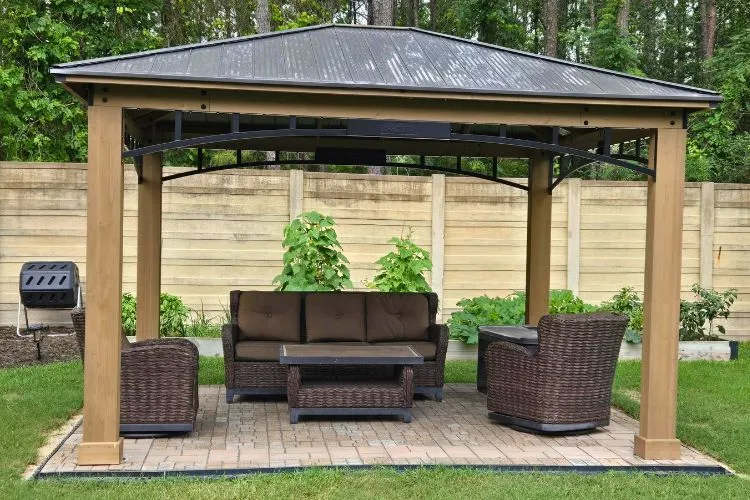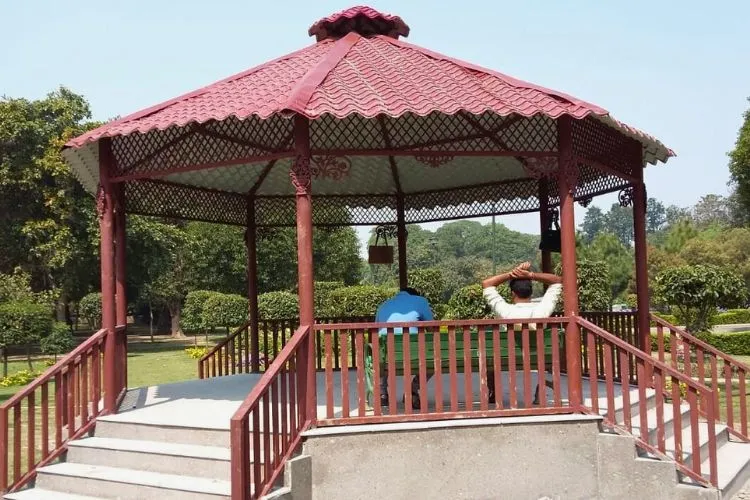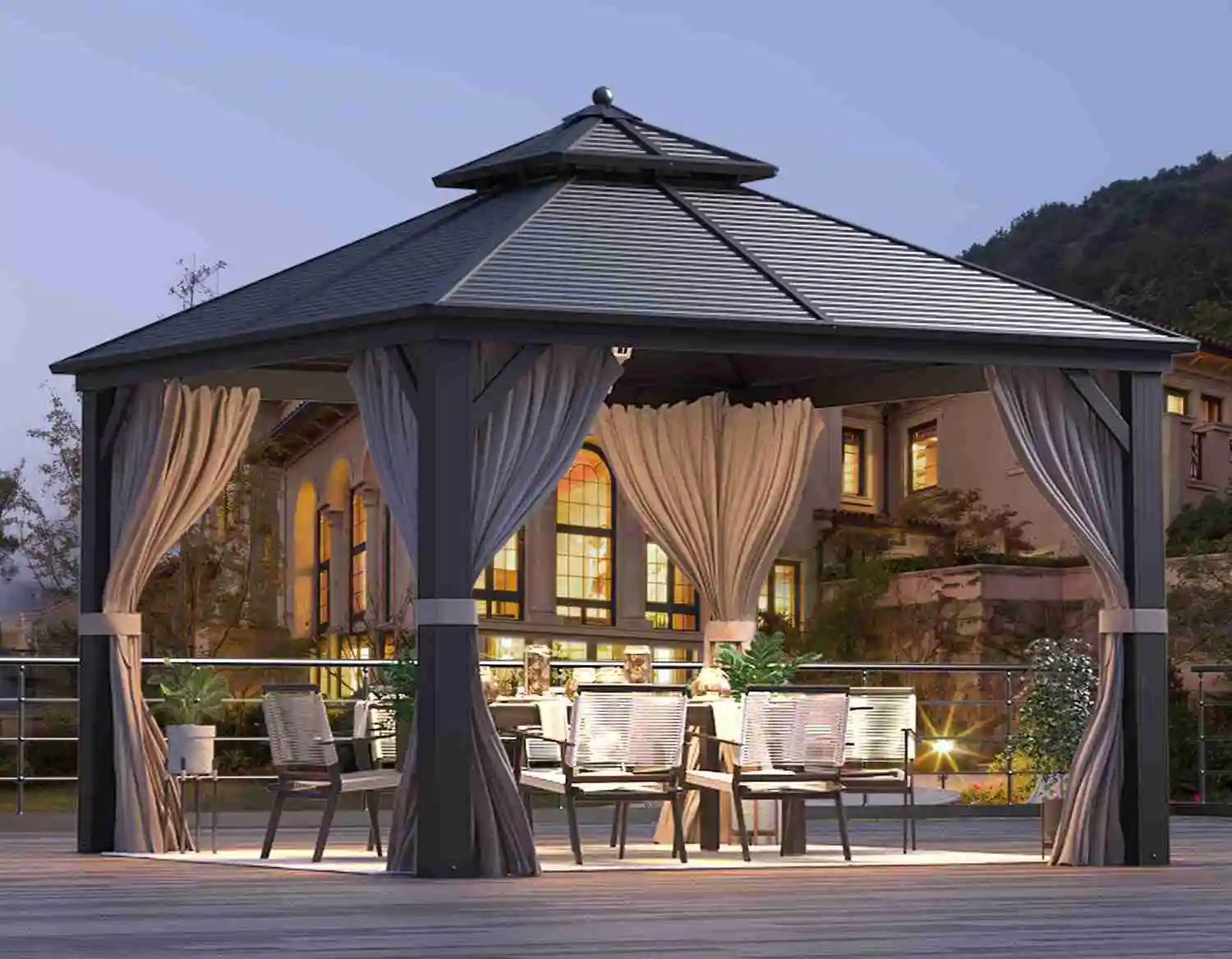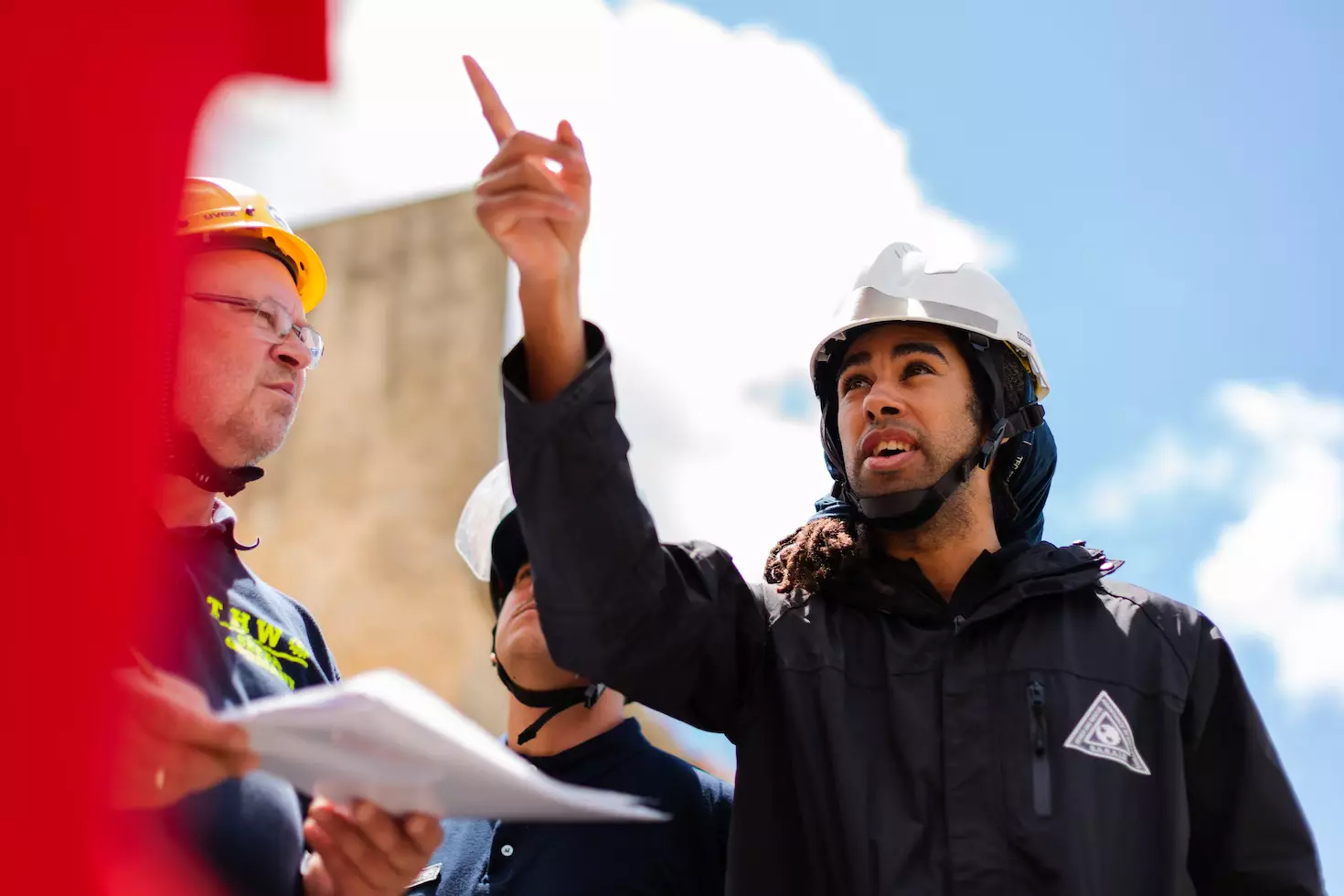The serene ambiance of a garden or backyard can be significantly enhanced by the addition of a gazebo. When it comes to choosing the right roof material, metal is often a topic of debate, primarily due to concerns about noise. So, are metal gazebo roofs noisy?
This article will guide you through the reality behind metal gazebo roofs and their noise levels during rainfall, providing a comprehensive overview to help you make an informed decision.

Contents
- 1 Understanding Metal Gazebo Roofs
- 2 Are Metal Gazebo Roofs Noisy?
- 3 Factors Influencing Noise Levels
- 4 Comparing Noise: Metal vs. Other Roofing Materials
- 5 Minimizing Noise from Metal Gazebo Roofs
- 6 Installation Best Practices for Noise Reduction
- 7 Seasonal Considerations for Noise Levels
- 8 Frequently Asked Questions (FAQs)
Understanding Metal Gazebo Roofs
Metal roofs for gazebos are popular due to their durability, longevity, and aesthetic appeal. They come in various materials, including aluminum, steel, and copper, each offering unique benefits.
Metal roofs are known for their resistance to harsh weather conditions, including heavy rain, hail, and high winds, making them a practical choice for outdoor structures like gazebos.
Are Metal Gazebo Roofs Noisy?
Yes, metal gazebo roofs can be noisy, particularly during rain or hailstorms when the impact of the precipitation on the metal surface generates sound.
The level of noise depends on factors such as the type of metal used, the thickness of the roofing material, and any underlying insulation or sound-dampening materials.
Some people might find the sound generated during rain to be pleasant or negligible, while others may consider it disruptive.
To reduce noise, some metal gazebo roofs can be designed with insulation layers or constructed using materials that minimize sound transmission.
Factors Influencing Noise Levels

Material Thickness and Type
The thickness of the metal plays a crucial role in determining the noise level. Thicker materials tend to dampen sound more effectively than thinner ones.
Additionally, the type of metal can influence sound transmission, with some metals providing better sound insulation than others.
Roof Underlayment and Insulation
The presence of an underlayment or insulation layer beneath the metal can significantly reduce noise. These materials act as a barrier, absorbing the sound vibrations caused by rain, thus minimizing the noise heard below.
Installation Technique and Structure Design
How a metal roof is installed, including the structure of the gazebo itself, also affects sound levels. A well-designed gazebo with a solid frame and correctly installed metal roof can greatly reduce noise transmission.
Comparing Noise: Metal vs. Other Roofing Materials
Contrary to popular belief, metal roofs do not necessarily produce more noise than other materials. Advances in metal roofing technology have led to products designed to minimize noise, making metal roofs comparable to, if not quieter than, alternatives like asphalt shingles or wood shakes.
Minimizing Noise from Metal Gazebo Roofs
If noise is a concern, there are ways to minimize it effectively. Installing sound-deadening insulation or underlayment is a practical approach. Some newer metal roof products are specifically designed to reduce noise, featuring built-in insulation layers.
Installation Best Practices for Noise Reduction
When installing a metal gazebo roof, particular practices can significantly reduce potential noise issues. Begin by selecting a high-quality metal with a thicker gauge, as this can naturally dampen sound.
Utilize a solid sheathing underneath the metal panels; plywood is a common choice that serves as an additional barrier to sound transmission.
The addition of a specialized acoustic underlayment designed for noise reduction is also crucial, as these materials absorb and dissipate the sound vibrations from rain and hail.

Ensure that the metal panels are securely fastened and that there’s minimal space between the sheathing and metal, as gaps can allow sound to resonate.
In areas with frequent rain, consider adding a layer of sound-deadening insulation between the metal roof and the gazebo structure. Be aware that precise installation is key—not only should the fasteners be tight and the seams well-sealed, but improper installation can increase noise levels.
Working with an experienced roofing professional, familiar with acoustic considerations, will ensure that these best practices are effectively implemented for a quieter metal gazezebo roof.
You may also find useful: Hardtop vs Soft Top Gazebo: Easy To Understand Comparison
Seasonal Considerations for Noise Levels
The impact of seasonal changes on the acoustics of a metal gazebo roof is a crucial aspect to consider. During the rainy season, the intensity and frequency of precipitation can lead to increased noise levels, especially during heavy downpours.
In contrast, light rain may produce a gentle, rhythmic tapping that can be quite soothing. In winter, the noise character can change; the sound of snow accumulating on a metal roof tends to be muffled and less intrusive compared to rain.
Temperature fluctuations between seasons also affect metal’s expansion and contraction, potentially leading to varying sound outputs like popping or creaking noises.
Colder temperatures might stiffen the material, possibly altering its acoustic properties and how sound travels through it.
To effectively manage these variations, the installation of proper insulation and the use of sound-dampening materials are essential.
These measures not only help in reducing noise regardless of the season but also aid in maintaining a consistent temperature under the gazebo, enhancing overall comfort and usability year-round.
Frequently Asked Questions (FAQs)
Are metal roofs more expensive due to noise reduction features?
While metal roofs can be more costly upfront, the investment includes benefits like durability, energy efficiency, and in many cases, noise reduction features. The long-term savings in maintenance and energy costs can offset the initial expense.
How to reduce rain noise on a metal roof effectively?
Using sound-deadening insulation or underlayment materials during the installation phase is the most effective method. Choosing thicker metal roofing materials and ensuring a professional installation can also contribute to noise reduction.
Do metal roofs make popping noises or is it primarily rain noise?
Metal roofs can expand and contract with temperature changes, which may cause popping noises. However, proper installation and design can minimize this effect. Rain noise is a separate concern, primarily addressed through insulation and material choice.
While metal roofs can transmit sound, modern advancements in roofing materials and installation techniques have made it possible to minimize noise. Any potential disadvantages can often be mitigated through appropriate measures.
Conclusion:
The belief that metal gazebo roofs are inherently noisy is largely a misconception. Though they can transmit the sound of rain, several factors affect the level of noise, including the type of metal, thickness, insulation, and installation technique.
With advancements in roofing technology, metal roofs can offer a quiet, durable, and aesthetically pleasing option for gazebos. When properly installed with sound-dampening measures, metal roofs may not be any noisier than other roofing materials, providing a tranquil outdoor space for relaxation and entertaining.

Sergio Gomes, a passionate advocate for outdoor living and the male voice behind Shades Authority. With years of experience, Sergio is your trusted source for expert insights on gazebos, pavilions, cabanas, pergolas, and all things outdoor shade solutions. Join him on a journey to transform your outdoor spaces into stunning, functional retreats
